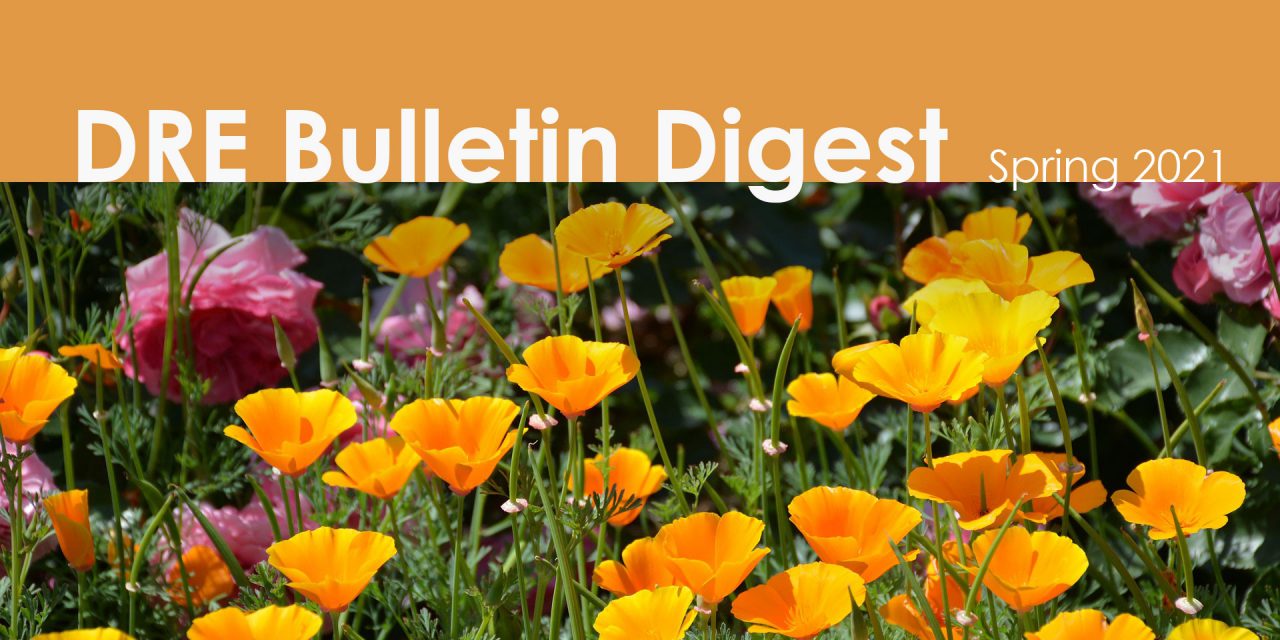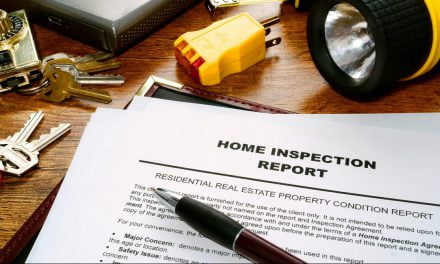The California Department of Real Estate (DRE) opens the Spring 2021 edition of their quarterly Real Estate Bulletin with a new beginning: the confirmation of Commissioner Doug McCauley. McCauley has been serving as DRE Commissioner under Governor Gavin Newsom’s appointment since May 2020, when he replaced Acting Commissioner Sandra Knau. McCauley’s recent Senate confirmation officially ties the knot.
Those of you following the DRE Commissioner saga will welcome this as the final baton pass — for now. After the departure of Wayne Bell and two acting commissioners, the DRE finally has a full-time commissioner. Read on for updates on McCauley’s efforts at the Department this quarter.
Fiduciary duty and electronic transactions
The DRE Commissioner’s message to real estate professionals this spring is this: slow down.
The twin crises of the ongoing pandemic and recession have made some anxious homebuyers (and agents) trigger happy. Commissioner McCauley urges licensees to perform due diligence even when clients pressure for quick action.
The Commissioner’s message is critical now that the industry has spent the last year adapting to new and fast-growing technologies. When clients can simply tap to skip through and sign documents in just a couple of minutes, they may not realize the implications of those documents. It’s important to ensure clients understand key terms and disclosures before signing, regardless of the delivery method.
Related video: Due diligence
Click here for more information.
Yes, the market is hot — but nothing burns quite as hot as buyer’s remorse. Even more importantly for real estate professionals, a little care now saves brokerages from DRE complaints later.
License expiration extension
The DRE has allowed licensees to delay their renewals throughout the pandemic — but the extensions are soon reaching an end. Licensees whose licenses expired between April 16, 2020 and June 29, 2021 now have until June 30, 2021 to complete their renewal under Executive Order N-83-20.
The executive order also gives applicants whose two-year windows to pass the license exam ended on or after April 16, 2020 until June 30, 2021 to schedule their license exams. Further, those who have passed their examinations and whose one-year deadline to apply for a license ended on or after April 16, 2020 now have until June 30, 20201 to apply.
No special action is needed to qualify; the extension is automatic. Not sure if you qualify? Read the full rundown below.
Related article:
Editor’s note — eLicensing is the fastest way to renew a DRE license online. Watch firsttuesday’s video renewal guide to get started.
Exam scheduling
The DRE’s exam centers suffered multiple closures throughout the pandemic and continue to operate at limited capacity. As a result, the Department is now addressing the hefty backlog of applicants amassed since the closures.
To expand testing capacity and meet demand, the DRE has added extra exam sessions. This expansion includes:
- evening sessions at the Sacramento exam center;
- an auxiliary exam center in Sacramento; and
- Saturday sessions at the La Palma, Sacramento and San Diego exam centers.
Although currently administering about 1,300 exams a week, applicants are still reporting difficulty scheduling some exams. Applicants can check for available exam sessions here. The DRE hopes its efforts will alleviate protracted wait times.
Editor’s note — Can’t wait for your new recruit’s license? Learn how licensed brokers and salespersons can properly employ aspiring agents as finders.
COVID-19 Tenant Relief Act
On February 1, 2021, the COVID-19 Tenant Relief Act (Senate Bill 91) took effect. The DRE takes a moment in the Spring 2021 Real Estate Bulletin to provide important information and resources to tenants and landlords related to this legislation.
The bill has two main elements, which:
- extend eviction protections established under the Tenant, Homeowner, and Small Landlord Relief and Stabilization Act of 2020 (Assembly Bill 3088); and
- provide rental assistance to qualifying tenants and landlords.
The bill’s eviction protections prohibit a landlord from evicting a tenant for failure to pay part or all of their rent between March 1, 2020 and January 30, 2021 due to financial distress related to COVID-19. This protection was extended through June 30, 2021, so long as the tenant provides their landlord with a declaration of COVID-19 Related Financial Distress and pays at least 25 percent of their unpaid rent by June 30, 2021.
The bill also establishes the State Rental Assistance Program, which covers 80 percent of an eligible household’s unpaid rent and utility costs accumulated between April 1, 2020 and March 31, 2021. Landlords accepting this rental assistance release all claims against the tenant for outstanding rent for the covered period. The DRE encourages all eligible landlords, especially small landlords, to apply.
Click below for our full analysis on the Tenant Relief Act, including compliance forms.
Related article:
Foreclosure relief scams
Together, the ongoing pandemic and recession have created the perfect hunting ground for scammers. Many are taking advantage of desperate homeowners facing foreclosure. To combat this trend, the DRE outlines five red flags that can help identify a foreclosure relief scam.
The DRE asks licensees to be wary of foreclosure relief programs that:
- make guarantees about stopping a foreclosure or securing a loan modification;
- require a fee in advance, especially as a wire transfer or cashier’s check;
- advise you to stop paying or stonewall your mortgage company;
- ask you to sign documents you don’t understand (especially if they ask you to sign over the deed to your home); and
- rely on high-pressure direct marketing.
For the most up-to-date information on foreclosure relief scams, visit the U.S. Department of Housing and Urban Development website. The DRE also encourages licensees to report suspicious activity to the DRE, Federal Trade Commission and California Attorney General’s Office.
Related article:
Condo maintenance responsibilities
In response to a frequently asked question, the DRE reminds licensees of the rules for maintenance of common areas in common interest developments (CIDs). Maintenance responsibilities for the areas owned in common are typically set forth in the development’s covenants, conditions and restrictions (CC&Rs). Every CID is different, so the DRE suggests first reviewing a development’s CC&Rs when in doubt.
When a development’s governing documents fail to provide clear language on maintenance responsibilities, the association is generally responsible for repairing, replacing, and maintaining the common area. [Calif. Civil Code §4775(a)]
While the DRE enforces guidelines during new a project’s planning phase, the Department does not oversee homeowners’ associations once the units have been sold. For questions regarding maintenance in a specific CID, first review the governing documents and contact the HOA.
Related Video: Convenants, conditions and restrictions (CC&Rs)
Click here for more information.
That’s a wrap on the Spring 2021 DRE Real Estate Bulletin! As always, check out the full Real Estate Bulletin on the DRE website.














